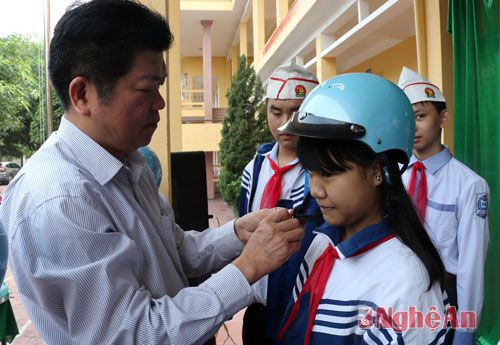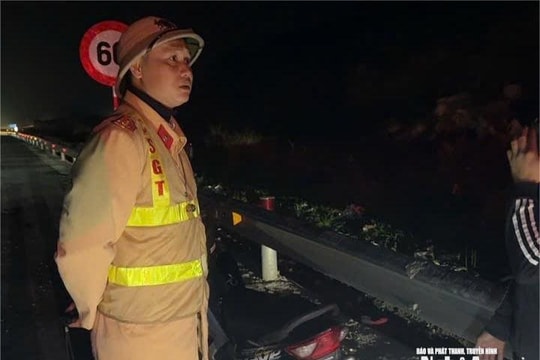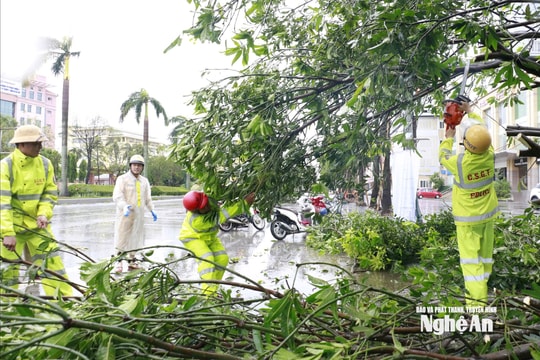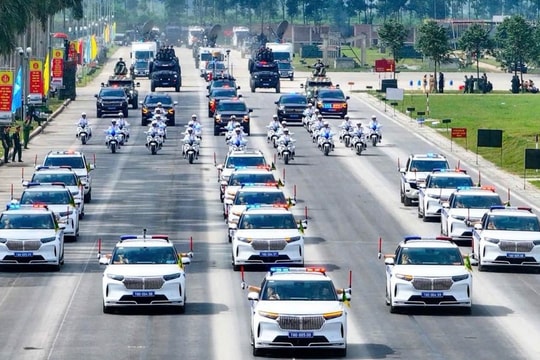Why do we have to punish them by... suspending them from school?
(Baonghean.vn) - Recently, on March 7, the Hanoi Department of Education and Training issued Document No. 932 on organizing an emulation movement to ensure traffic safety and order in the education sector for the period 2016-2020. It states that students who violate traffic safety and order will be suspended from school for 3 days or 1 week depending on the severity of the violation or recidivism. The reason is to give students time to self-criticize, for their families and localities to manage, educate and deter. Honestly, I just feel like something is not right.
Actually, the practice of disciplining students who violate the law by suspending them from school for a certain period of time is not unique to Hanoi, and it is not something that has only been done recently. I remember that when we were still in school, almost all schools used this method.
 |
| Nghe An Province Traffic Safety Committee gives helmets and propagates traffic safety laws to students. |
When a student violates a rule, the school's disciplinary board will meet and consider the form and level of discipline. Some cases result in suspension from school for a few days, some cases result in suspension from school for a week, some cases result in suspension from school for a year, and some cases result in suspension from school permanently - called expulsion or suspension from school.
Knowing that going to school, being able to learn, is an important right, the punishment given in the form of suspension from school means to limit the rights of the violator, that is, to punish by "hitting" the rights of the violator. Anyway, this form of punishment certainly has arguments and bases that have been thoroughly discussed. But in terms of deterrence and education, in reality, it seems that there are still many things that are not right.
Discipline in the form of suspension from school, whether for 3 days, or a week, or more, will make the student better? Because after implementing the form of discipline, the student will have a lot of difficulty keeping up with the curriculum in class, and therefore, the ability to absorb will be difficult to keep up with friends in the class. The state of knowledge gap is very likely to happen, affecting the student's learning ability and leading to subsequent psychological consequences.
Along with that, if we think that taking time off from school is for the family, local authorities to manage, educate... it doesn't seem very promising. In the family, during working hours, if everyone still has to go to work, then who will manage the students when they are off from school? It cannot be arbitrarily assumed that the father or mother must also take time off from work corresponding to the time the child is punished to stay home to manage and educate. Although it cannot be denied that educating children is extremely important.
As for assigning education and deterrence to local authorities, this seems to be fine in theory, but in reality it is a different story. From the arrangement of responsible government officials to carry out education and deterrence, to the time, method, content, measures, deadline... all are matters of "whose, where". When we were in school, if someone was disciplined by the school by being suspended from school, the form of "coordinating education and deterrence with the locality" was basically still someone from the commune committee assigning the disciplined student to... weed the stadium, or clean up the commune committee office, as for how to do it, for how long... it was up to them. The students did it whether they could do it or not, then they would hang around, wait, and then be sent home with a certificate with words that were very "suitable for coordination requirements"...
Therefore, in the context of security and order in both rural and urban areas having many changes compared to before, it is thought that those who are working in education, those who are responsible for giving disciplinary measures in the education system, in all levels, need to research and adjust to have a disciplinary measure that is both serious, practical and effective. To truly have both deterrence and education, making students who violate after implementing the "disciplinary sentence" will make more progress.
For example, instead of giving them time off from school, they require them to study more, do more homework, and then require them to meet mandatory knowledge standards during the “disciplinary period”. I remember that the literature teacher asked a student to recite a short story when he made a mistake in class. This method proved to be very effective, even very… interesting, making the offender remember it for life. And it was clearly more progress, at least he could recite a short story.
Furthermore, instead of sending them back to their locality or family, they are handed over to the school or student organizations for education and deterrence. Of course, the family and locality are still responsible and must participate, but in a coordinated and responsible role.
Duc Duong
| RELATED NEWS |
|---|

.jpeg)






